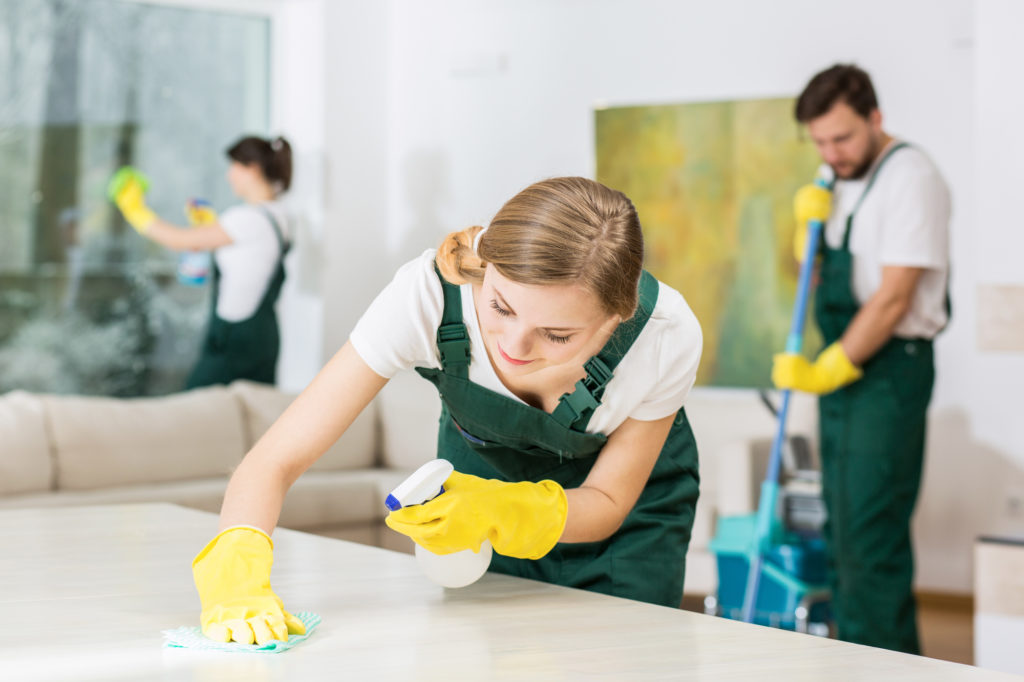
What’s the Right Cleaning Frequency for Your Office?
One of the most common questions I hear from business owners is: “How often should my office really be cleaned?” It sounds simple, but getting this right can make a huge difference in your team’s health, productivity, and overall impression on clients.
I’ve spent the last 10 years running a successful commercial cleaning company here in Michigan, and let me tell you—no two offices are exactly alike. The right cleaning frequency depends on your building size, how many people use the space, your industry, and even the time of year.
Let’s break down how to figure out the ideal cleaning schedule for your office—and where you can adjust without sacrificing hygiene.
Start With This Question: How Busy Is Your Office?
The more foot traffic your building sees, the more frequently it needs attention. A 5-person law firm with occasional visitors doesn’t need the same cleaning routine as a 60-person call center with a busy reception area.
Here’s a quick reference based on office size and traffic:
- Small offices (under 10 employees): 2–3 cleanings per week may be enough for general upkeep.
- Medium offices (10–30 employees): Daily cleaning is typically ideal.
- Large offices (30+ employees or high-traffic): You’ll likely need a mix of daily cleaning plus weekly deep-cleaning tasks.
Keep in mind: even if your office is small, common areas like kitchens, bathrooms, and reception zones still need consistent attention.
Industry Also Matters—A Lot
Some industries demand higher cleaning frequencies because of health, safety, or compliance reasons. For example:
- Medical offices: Daily disinfection is non-negotiable. Exam rooms and restrooms may need multiple cleanings per day.
- Food-related businesses: Require frequent sanitization of any shared or prep areas.
- Tech companies or creative agencies: Often prioritize a clean aesthetic for clients and team morale—but the actual cleaning needs may vary.
If you’re in an industry where visitors, compliance, or sensitive environments are part of the equation, your cleaning frequency should reflect that.

The Core Cleaning Frequency Breakdown
Here’s how I typically structure cleaning frequencies for my clients:
Daily Cleaning Tasks
- Empty trash and recycling
- Disinfect door handles, light switches, and high-touch surfaces
- Wipe down desks, phones, and shared equipment
- Sanitize restrooms
- Clean kitchen surfaces and breakroom tables
- Vacuum high-traffic areas
This keeps your space looking presentable and reduces the spread of germs—especially important during flu season or COVID surges.
Weekly Cleaning Tasks
- Mop all hard floors thoroughly
- Dust blinds, baseboards, and window sills
- Deep clean conference rooms
- Restock cleaning supplies and toiletries
- Disinfect phones and computer peripherals
Monthly or Seasonal Tasks
- Shampoo carpets and upholstery
- Clean HVAC vents and air returns
- Wash windows (interior and exterior)
- Polish furniture and wood finishes
- Deep clean staff refrigerators and microwaves
Think of these as the “preventive maintenance” steps that help preserve your building and keep long-term costs down.
Customize Based on Usage Patterns
Not every office runs 9 to 5 Monday through Friday. Some have hybrid schedules, rotating staff, or remote teams using space a few times a week.
If your usage is inconsistent, you might not need daily service. Instead, consider every-other-day cleaning, with a deep clean on Friday before the weekend.
I often help clients build a custom cleaning schedule based on their calendar and staffing. You can still maintain a professional, hygienic environment while saving on unnecessary service days.
Don’t Forget the Touchpoints
One thing I stress with every client: pay attention to high-touch zones. Even if you opt for less frequent cleaning overall, your cleaning plan should always prioritize areas like:
- Door handles
- Elevator buttons
- Faucet handles
- Shared phones and keyboards
- Breakroom appliances
These should be wiped down and disinfected daily—or even twice daily in larger or more active offices.

Why Too Much—or Too Little—Cleaning Can Waste Money
One of the biggest mistakes I see businesses make is misunderstanding how cleaning frequency affects value. If your office is being cleaned too often, you’re likely overpaying for services you don’t fully use. If it’s cleaned too infrequently, dust, bacteria, and clutter build up fast—leading to more expensive deep cleans, staff sick days, or even lost clients due to poor impressions.
Getting the schedule right isn’t just about cleanliness—it’s about return on investment.
Here’s a general guideline I use when recommending service frequencies across different industries:
General Office (Admin, Marketing, Tech)
- Daily: Trash removal, restrooms, kitchen touch-ups
- Weekly: Floors, dusting, detailed kitchen cleaning
- Monthly: Carpet or upholstery refresh, windows
Medical & Dental Offices
- Daily: Disinfection of all patient areas, restrooms, front desk surfaces
- 2x Daily: Exam rooms and shared tools
- Weekly: Floors, vents, high shelves
Retail & Customer-Facing Spaces
- Daily: Entrance cleaning, glass doors, cash wrap counters
- Weekly: Stockroom dusting, deeper floor care
- Seasonally: Full deep clean, especially pre-holiday rush
Industrial & Warehouses (with offices)
- 2–3x Weekly: Office areas, restrooms
- Daily: Breakrooms and shared spaces
- Monthly: Equipment areas and floors (if required)
The key is balance. When cleaning matches your actual needs—not less, not more—you’ll protect your space, impress your clients, and make every dollar count.
When to Scale Up (or Down)
Here’s a good rule of thumb: if you’re seeing more dust than usual, noticing trash cans overflow, or hearing employee complaints about dirty restrooms, it’s time to reassess your frequency.
On the flip side, if you’re paying for daily cleanings but your team is remote three days a week, there’s room to reduce costs without cutting corners.
Seasonal spikes (like cold and flu season) are also a good time to temporarily increase service. You can always scale back once things settle down.
Cleanliness Is a Competitive Advantage
At the end of the day, your office’s cleanliness impacts employee satisfaction, client perception, and even workplace safety. And getting the cleaning frequency right is one of the smartest investments you can make in your business.
If you’re unsure where to start, ask your cleaning provider for a walk-through and assessment. A good janitorial partner will design a plan that fits your space, budget, and schedule—and help you adjust as your business evolves.

Questions to Ask Before Hiring a Cleaning Company
Choosing the right office cleaning partner isn’t just about price—it’s about trust, consistency, and whether they truly understand the demands of your space. I’ve seen too many businesses lock into long-term contracts with companies that overpromise and underdeliver.
If you’re evaluating providers or looking to make a switch, here are the key questions I recommend asking during the vetting process.
Do They Offer Flexible Cleaning Plans?
Your business isn’t static, and your cleaning schedule shouldn’t be either. Ask if the company can scale service up or down based on changes in your office size, hours, or staff schedules. Flexibility is especially important if your team works hybrid or seasonally.
Are Their Cleaners Background-Checked and Insured?
Reputable cleaning services should run background checks and carry both liability insurance and worker’s comp coverage. If something goes missing or a cleaner is injured on your property, you want to know you’re protected.
Do They Understand Industry-Specific Requirements?
Every business has its quirks. A cleaning company that works with medical offices should know HIPAA boundaries. A retail space needs someone who understands customer-facing detail work. Make sure the team has experience with your type of environment—not just a general office setup.
Can They Handle Deep Cleans or One-Time Projects?
Even if you don’t need deep cleaning every week, there will be times—after a renovation, during flu season, or before a big client visit—when you need more than the usual wipe-down. Ask if they offer one-time services like carpet shampooing, floor waxing, or window washing, and whether they’re available on short notice.
What Products and Equipment Do They Use?
It’s fair to ask whether they bring their own supplies and if those products are eco-friendly, fragrance-free, or aligned with any green building standards. If your team has allergies or your office is LEED-certified, this matters more than you might think.
How Do They Communicate Issues or Feedback?
A professional cleaning company should provide a clear point of contact, offer routine inspections, and be proactive about identifying maintenance issues before they escalate. If you have to chase them down to fix something, that’s a red flag.
Will They Provide a Walkthrough and Quote?
Before signing anything, invite the provider in for a walkthrough. This lets them see your space, understand your needs, and give you a more accurate, customized quote. Avoid companies that push generic pricing without first seeing your facility.
—
Written by Lucas Bryant, a Michigan State University graduate with a bachelor’s degree in Environmental Health and Safety. I own a successful commercial cleaning company in Michigan and have spent the last 10 years helping offices of all sizes stay clean, compliant, and cost-efficient. I’m also a writer and editor for Kwote Advisor, where I share insights on smart janitorial planning and sustainable facility hygiene.

